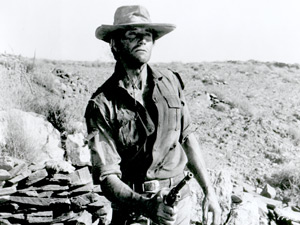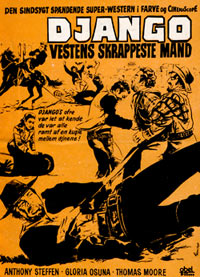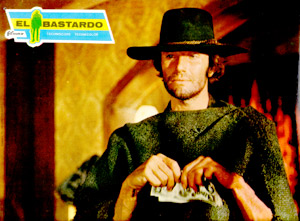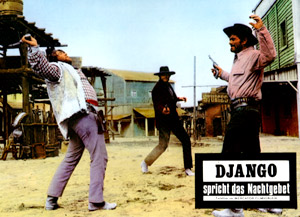 |
| THE FILMS OF... ANTHONY STEFFEN |
 |
 |
Anthony Steffen in A TRAIN FOR DURANGO |
Born in Rome on the 21 st July 1930, Anthony Steffen appeared in over 60 films, many of them in the lead role. Despite often (and unfairly) being detracted as a ‘wooden’ performer, he had a cult following amongst European Exploitation fans, mainly thanks to his star turns in a number of effective spaghetti westerns from the late 60s and early 70s. Beyond this, however, he had a fruitful career that reflected the comparatively brief period in which Italian cinema flourished, appearing in a varied selection of international co-productions from the 1950’s onward.
The son of ex-racing driver and Brazilian Ambassador Manoel De Teffè , he was originally named Antonio Luiz, but later adopted the inherited De Teffè title. Despite these noble origins, and like so many of his countrymen, he joined the partisans in the Second World War. After the conflict, he decided to pursue a career in the emerging cinema industry, and gained his first experience by working in a minor production capacity on a handful of acclaimed films (‘Messenger Boy’ on Vittorio De Sica’s The Bicycle Thief (Ladri di biciclette, 48), ‘Second Assistant Director’ on Mauro Bolognini’s Ci troviamo in galleria (53)).
 |
Danish film programme for A FEW DOLLARS FOR DJANGO |
In the mid-1950’s, he moved into acting with secondary roles in a number of small scale dramas that were intended primarily for the domestic market (Mario Mattoli’s Le diccioteni (55), Riccardo Freda's Beatrice Cenci (56)). He also found gainful employment in the ‘peplum’ films that had propelled Roman studios such as Cinecitta and Titanus to the forefront of global moviemaking. In the post-war era, Italy had become a focal point for the filming of big-budget biblical and historical epics (Ben-Hur (59), Cleopatra (63) and the like). As well as flooding the industry with untold-of amounts of cash, these also provided a fabulous training ground for local filmmakers, who would use the experience when helming their own, smaller-scale productions. Robert Aldrich’s bloated Sodom and Gomorrah (62), in which Steffen had a small role, is a case in point: second unit director Sergio Leone went on to have a much more lasting impact on film history with his A Fistful of Dollars (Per un pugno di dollari, 64). Other peplum and costume dramas that featured Steffen include Aphrodite, The Goddess of Love (58), The Devil's Cavalier (59)
In fact, it was Sodom and Gomorrah that provided the touch-light for the genre in which Steffen was to achieve his greatest success. Following the success of Fistful and its sequel, For a Few Dollars More, enterprising producers were eager to back similar ‘spaghetti’ westerns shot in Italy and Spain . From the period between 1965 and 1973, over 500 such films were made; a number of them proving considerably successful, both domestically and internationally.
 |
Anthony Steffen shows an aristocratic disdain for cash in DJANGO THE BASTARD |
He was one of several actors to carve a reputation within the genre. If their inspiration was Clint Eastwood in the Leone films, the more successful amongst their number managed to carve out a unique persona for themselves. Despite playing different characters, they retained similar qualities from one role to the next, generally reflecting some quality within the actors themselves (and often reflecting particular aspects of Italian society). And this, perhaps, lies at the heart of the underestimation of De Teffè’s acting skills.
Giuliano Gemma represented the irrepressible, optimism of the peasant; George Hilton the wily, passionate, instinctive Mediterranean spirit; Gianni Garko the cunning manipulator, the politician and the magician; Peter Lee Lawrence the vitality (and occasional degeneracy) of youth. De Teffè, on the other hand, was the stoic, slightly passive Italian everyman, usually caught up in the machinations of corrupt powerbrokers (or even fate itself), but stumbling through and succeeding thanks to his sense of morality, courage and talent with a gun. In film after film he was also on the receiving end the recipient of physical punishment, purification rituals that emphased the catholic nature of his roles (he’d have been completely at home as unfortunate central character of Mel Gibson’s The Passion ). In films like Blood at Sundown, Shango, Killer Kid and Django the Bastard (the most controlling character that he would play in a western, and one who happened to be dead) his immobility – or ‘woodenness’ - is an integral component of the portrayal.
 |
Shoot, Steffen, shoot... THE MAN WHO CRIED FOR REVENGE |
Away from the Spaghetti Westerns, he had a little more freedom. A Man Called Joe Clifford, possibly the most animated of his sagebrush performances, seems entirely repressed in comparison to the hilarious histrionics of The Night That Evelyn Rose from the Grave, and he even proved capable of displaying genuinely subtlety in the likes of Roma l’altra faccia della violenza. This makes it a shame that his career is often appraised on the strength of just one segment of his work, a segment in which he was obliged to play ‘in type’ more often than not.
As with many of his contemporaries, the number of his appearances declined as the 70s progressed, and he eventually retired to Brazil (where he had filmed Killer Fish) in the 1980s. He died at the age of 73, following a long battle against cancer, ironically at the time when many of his films have begun to gain a considerable following thanks to their re-emergence on DVD. Addio, Antonio!
Anthony Steffen film reviews:
 Le diccioteni (55) Le diccioteni (55)
 Beatrice Cenci (56) Beatrice Cenci (56)
 Aphrodite, The Goddess of Love (58) Aphrodite, The Goddess of Love (58)
 The Devil's Cavalier (59) The Devil's Cavalier (59)
 Sodom and Gomorrah (62) Sodom and Gomorrah (62)
 The Last Tomahawk (64) The Last Tomahawk (64)
 The Invincible Gladiators (64) The Invincible Gladiators (64)
 I figli del leopardo (65) I figli del leopardo (65)
 A Coffin for the Sheriff (65) A Coffin for the Sheriff (65)
 Why Go On Killing (65) Why Go On Killing (65)
 Seven Dollars to Kill (66) Seven Dollars to Kill (66)
 An Angel for Satan (66) An Angel for Satan (66)
 A Few Dollars for Django (66) A Few Dollars for Django (66)
 Ringo: The Mark of Vengeance (66) Ringo: The Mark of Vengeance (66)
 Blood at Sundown (66) Blood at Sundown (66)
 Gentleman Killer (67) Gentleman Killer (67)
 Killer Kid (67) Killer Kid (67)
 A Train for Durango (68) A Train for Durango (68)
Visit our Anthony Steffen forum
Matt Blake
|

